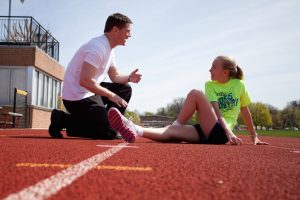For individuals seeking a career in sport psychology (SP), there are numerous options for those who have earned master’s and doctoral degrees in SP. Most individuals with master’s degrees work in athletic academic advising, as teachers or coaches, as licensed professional counselors (LPCs) within certain specialized areas, or go on to pursue a doctoral degree. The two primary career paths for those with doctoral degrees are in the clinical or counseling psychology profession or in research and teaching in academia.
A master’s degree in SP may lead to one of five main options (excluding pursuing a doctoral degree).
- Athletic academic advising. Most U.S. universities are members of the National Collegiate Athletic Association (NCAA). All universities in the NCAA’s Division I are required to operate athletic academic advising entities, which provide academic counseling for their student–athletes. Athletic academic advisers work with student–athletes on course scheduling, study skills, and time management, but may also address a variety of life skills with their student–athletes. The National Association of Academic Advisers for Athletics (www .nfoura.org) is the main professional association for athletic academic advising. An SP’s background is an excellent preparation for this career.
- Teaching and coaching. Depending on one’s academic interests (psychology or other areas), an SP degree allows one to work potentially more effectively as a school teacher, coach, or both and may allow for private practice work in performance enhancement consulting. The master’s degree may also potentially increase one’s salary by having obtained a postgraduate degree.
- Fitness and performance training for the military. A relatively new and very exciting career route is with the military through the Comprehensive Soldier Fitness–Performance and Resilience Enhancement Program. These individuals work at U.S. Army bases with soldiers to better prepare them for their combat experience, as well as with the soldiers and families when the soldiers return from combat (Wounded Warriors; transitioning back into the community).
- Licensed professional counseling. Working as an LPC (termed differently in different states) requires a clinical or counseling psychology master’s level degree. The trained individual is licensed, certified, or accredited, depending on the state, to work within psychology, and get paid, including third-party reimbursement.
- Consulting. Positions developed by individuals to suit their skills—niche creation—may include performance enhancement consulting in educational sport psychology work with athletes and recreational sport participants. This could also involve work in a health club or fitness center, in a research position, or as a wellness or life coach. The possibilities are only limited by an individual’s imagination.
 Career paths for holders of a doctoral degree center on work as a licensed psychologist or work in academia. Obtaining a doctorate, either a doc- tor of philosophy (PhD) or a doctor of psychology (PsyD) degree in clinical or counseling psychology provides the clearest route toward becoming a licensed psychologist and being able to work competently, ethically, and effectively as a sport psychologist. Such individuals may be found in private practice (individual or group practice) or in a more formal position. Individuals in private practice generally see clients across a number of areas within clinical or counseling psychology and develop the sport component of their practice as an added area of expertise. Although very few individuals have been able to become sport psychologists with 100% of their clientele being sport and exercise participants, it remains a possibility. Such professionals see clients, individually or in groups, for areas that can encompass performance-related skills such as goal setting, arousal control, imagery, attentional control, and self-talk but also clinical issues such as eating disorders, substance abuse, anger management, relationship issues, and so on. They may conduct workshops on a variety of sport psychology-related topics for teams. It is more common for psychologists to work with nonsport populations for part of their practice and sport participants for the other part. This may be by choice or because of client demand in the geographical area in which the psychologist practices.
Career paths for holders of a doctoral degree center on work as a licensed psychologist or work in academia. Obtaining a doctorate, either a doc- tor of philosophy (PhD) or a doctor of psychology (PsyD) degree in clinical or counseling psychology provides the clearest route toward becoming a licensed psychologist and being able to work competently, ethically, and effectively as a sport psychologist. Such individuals may be found in private practice (individual or group practice) or in a more formal position. Individuals in private practice generally see clients across a number of areas within clinical or counseling psychology and develop the sport component of their practice as an added area of expertise. Although very few individuals have been able to become sport psychologists with 100% of their clientele being sport and exercise participants, it remains a possibility. Such professionals see clients, individually or in groups, for areas that can encompass performance-related skills such as goal setting, arousal control, imagery, attentional control, and self-talk but also clinical issues such as eating disorders, substance abuse, anger management, relationship issues, and so on. They may conduct workshops on a variety of sport psychology-related topics for teams. It is more common for psychologists to work with nonsport populations for part of their practice and sport participants for the other part. This may be by choice or because of client demand in the geographical area in which the psychologist practices.
Making a living as a psychologist in private practice is challenging, and many individuals opt for more formal positions such as in a university setting, perhaps within an athletics department (there are a limited number of these opportunities), or more often, as part of a university or college counseling center working part of the time with athletes. There are many different models for how this can work, such as half-time in the counseling center and half-time in athletics. The more elite positions are those as sport psychologists with the United States Olympic Committee (there are six such positions in the United States, although there are, of course, positions available with Olympic teams in other countries) or with professional teams. However, even though there are hundreds of professional teams across the various sports and levels (including minor leagues), there are very few sport psychologists who have full-time positions. More commonly, sport psychologists in private practice (or in academia) consult with such teams as needed.
What qualifies licensed clinical or counseling psychologists to call themselves sport psychologists? Although ethical standards require one to only work within one’s area(s) of competence, some clinical or counseling psychologists believe that, because they are avid exercise and sport participants, this automatically provides them with the expertise to work as a sport psychologist. However, although they may be excellent clinical or counseling psychologists, there is a body of knowledge and research that the profession of SP believes is necessary to work effectively as a sport psychologist. Division 47 (Exercise and Sport Psychology) of the American Psychological Association is working on guidelines to facilitate developing one’s competency in SP. For the moment, the process of becoming a Certified Consultant within the Association for Applied Sport Psychology (CC-AASP) provides the clearest path for developing a level of competency. The CC-AASP process does not have a clinical or counseling focus but rather a performance- enhancement focus. The CC-AASP certification process, as well as AASP ethical guidelines, specify the performance enhancement focus of this certification. Thus, clinical or counseling psychologists and academic sport psychologists are aware of the limitations and extent of this certification.
There are a few clinical or counseling psychologists who work in academia, generally within psychology departments. The majority of individuals within academia in SP are found through the kinesiology route, which is another primary career path for those more interested in an academic career. Primarily within kinesiology (or exercise and sport sciences or physical education or other such names), individuals with doctoral degrees in sport psychology from such departments remain within the discipline and teach and conduct research. Many of these individuals have consulting practices outside of their primary job within academia. A few of these positions are found in psychology departments, but these individuals have usually earned their degrees in psychology departments. These academic sport psychologists teach a variety of SP related courses at the undergraduate and graduate levels, and conduct research across a wide variety of topics within the field. They also engage in service to their university as well as to the profession (becoming an officer in a sport psychology organization such as AASP).
Some individuals work as performance psychologists, some with clinical or counseling psychology degrees and many as licensed psychologists, in occupations where performance is critical to success. These individuals may work with companies such as Cirque du Soleil, the New York City Ballet, Wall Street traders, or with medical school students, police, and firefighters. Although this encyclopedia focuses on sport psychology, it should be noted that many of the skills learned within this field are generalizable across other performance settings and, depending on one’s background, one can find success in these other performance domains. A number of books are available by those who have worked in these specialized settings, particularly dance and the performing arts. This area has become known as performance psychology, to acknowledge the emphasis on performance in general (in a variety of performance domains, especially the performing arts) rather than sport per se.
While the focus of many individuals (and most books in the field) is on sport psychology, particularly with high-level and elite athletes, there will be many opportunities in the future for work within exercise psychology. Increased attention is being paid to the high prevalence of obesity and sedentariness in the general public, and exercise psychologists can work effectively within health care settings to facilitate motivation and adherence to exercise and physical activity and counteract this trend, now widely recognized as a public health issue. These opportunities may come through academia or in private enterprise within health clubs or fitness centers, corporations, insurance companies, and other entities.
Although there are a few undergraduate pro- grams in sport psychology, the main route to a career in the field, as noted earlier, is through graduate study. To become a clinical or counseling psychologist, the recommended route is to obtain a PhD or PsyD in clinical or counseling psychology, either as the next step after one’s undergraduate program or after obtaining a master’s in sport psychology from a kinesiology department. The academic route generally finds individuals with master’s degrees in kinesiology or clinical or counseling psychology followed by a PhD in kinesiology, specializing in sport and exercise psychology. These individuals often work as performance enhancement consultants.
Deciding on the best career path can be a challenge, although the availability of numerous paths to one’s goal can be advantageous for individuals with a variety of backgrounds. Full descriptions of a variety of educational programs are available, as well as other resources to assist the prospective sport psychologist, including extensive coverage of career opportunities in exercise and sport psychology and personal accounts by professionals in the field.

Leave a Reply